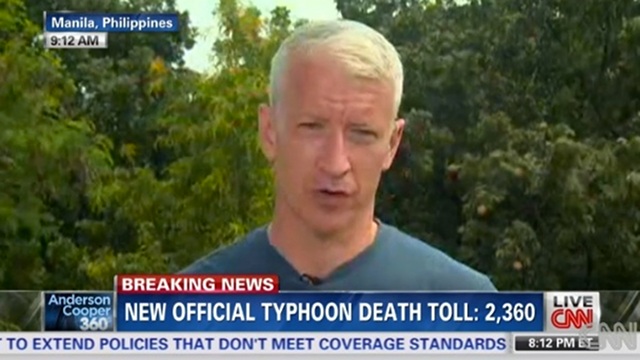Filtered By: Opinion
Opinion
Outside the box: Of disaster tourists and parachute journalists
By YASMIN D. ARQUIZA
His voice cracking, CNN anchor Anderson Cooper seemed on the verge of tears as he read the headlines about his coverage of the Yolanda crisis in Leyte. By now, everyone is near breaking point – typhoon victims crying for help, weary reporters filing news stories from ravaged zones, overwhelmed government officials trying to respond to a record-breaking natural disaster.

CNN's Anderson Cooper reported from Tacloban five days after Yolanda hit that "People are desperate. People do not have any place for shelter. It’s very difficult for people to get food. . .It is a very, very bad situation here.”
But then again, no amount of readiness could have prepared anyone for the massive destruction from super typhoon Yolanda, the latest in a series of local crises that the national government has faced recently.
Last September, there was the rebel attack in Zamboanga City. Last month saw the devastating quake in Bohol. If things indeed come in threes, hopefully Yolanda will be the last for the country this year, a sobering context that the international media may want to take into account in their soundbite-friendly dispatches from the field. The government's resources have been stretched thin – one official said they were unable to provide shelter in Leyte as their tents were already in Bohol, and with only a couple of C-130s in operation and soldiers still presumably guarding Zamboanga, their post-Yolanda response has been decidedly sparse.
The problem in reporting a disaster of this magnitude, stretching across a string of islands hundreds of kilometers apart from east to west, is that the stories often resemble the tale of the six blind men and the elephant – depending on who's touching which part of the animal, you'll get a different description each time. Most of the images have been distressing, and it's often hard to tell if the reports from parachute journalists – we haven't seen this many since the days of coup d'etats in these parts – are mostly anecdotal or very much reflective of the reality in the field, given the tendency of foreign correspondents to generalize situations at times.
So far, most of the reporting has been Tacloban-centric, speaking of which only a few have pointed out the elephant in the room: it's Imelda country, and the Aquino government is not especially fond of the Romualdez clan. No matter what officials say, petty politics is affecting the lack of coordination in clearing the streets of bodies and attending to residents at the airport pleading for a ride out to escape their misery. But it's reassuring to note that in other LGUs like Palo in Leyte and Basey in Samar, there seems to be a more organized response compared to the chaos in Tacloban.
Certainly, PNoy could do a lot better. One week on, it's fairly obvious that his trusted crisis committee composed of Interior Sec. Mar Roxas, Defense Sec. Voltaire Gazmin, and Social Works Sec. Dinky Soliman is ill-equipped for the enormity of the reconstruction job ahead. Only Soliman, who describes the triumvirate as the "first in, last out" team, has enough organizing experience among the three to direct relief efforts.
There's a time to delegate tasks, and a time to dictate things that need to be done. This is no time for disaster tourists, as one friend described his status morbidly while displaying the contents of his emergency pack before another difficult assignment. After counting bodies in post-tsunami Aceh, he was off to post-Yolanda Leyte, where the description seemed most apt for a familiar face in a yellow T-shirt directing traffic gleefully before the cameras.
What the post-Yolanda scenario needs is an experienced operations manager who can make sense of the country's geographic and infrastructure constraints, and craft an efficient rehabilitation strategy. Most sensible people don't expect President Aquino to take on this responsibility, but surely, in this country of event managers and international development experts, he can appoint someone competent enough to coordinate the massive relief effort? This is especially crucial in the coming days, with foreign aid flooding into the country and everyone watching the government to make sure the wasteful Napolesian saga will not happen again.
With so much work to be done, there is no room for recrimination. Be accurate, PNoy tells the media. Anderson resents the criticism, and even though his comments can raise eyebrows at times, social media denizens have pointed out there probably wouldn't be as much assistance coming in if the 24-hour cable news cycle had not documented the devastation from Yolanda.
The media has its shortcomings, and so does the government. But for now, Pnoy has to stop blaming local government units or the NDRRMC for the disorganized relief efforts, and exercise decisive leadership instead.
Yolanda's victims need help urgently, and it's time to take charge, Mr. President.
More Videos
Most Popular



